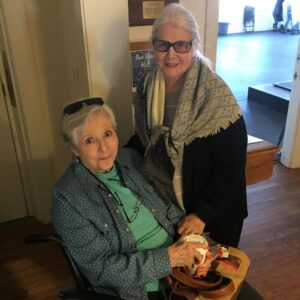
A REMEMBRANCE
By Tom Curren
Dayle Stanley was one of the key performers in the Boston-Cambridge Folk Revival and was among the first women in folk music circles to become a singer-songwriter. She was an enormously gifted artist, popular throughout the East Coast, and her influence can be heard in the style and substance of the generation of women folksingers who followed her.
Dayle Stanley was born and raised in Weymouth, on the Massachusetts South Shore. She attended local schools, and at an early age, began taking voice lessons in Boston; before she was in her teens, she was a trained operatic singer. Like many of her contemporaries in the early revival, she was heavily influenced by the popular folk music of Harry Belafonte and became inspired to take up the guitar. She embraced the ethic of the early revival and by about 1961 was performing in public locally. Eventually, she ventured into Boston to appear during the brief life of a club in Kenmore Square called “The Green Frog,” whose operating demise was noted by David Wilson in the pages of the first issue of Broadside in May of 1962.
Thus deprived of her first paying gig, Dayle made her way across the Charles to the Club 47 Mt. Auburn where she encountered Betsy Siggins, who remembers that she “signed her up on the spot!” In short order, Dayle became one of the first “regulars” at the Club. She is listed in an early undated poster as one of the sixteen featured performers at the Club, along with Tom Rush, Eric von Schmidt, Keith & Rooney, Bonnie Dobson, Jackie Washington, Geoff Muldaur, and the Charles River Valley Boys. In 1963, she was appearing weekly at the Club, at first sharing a regular bill with Muldaur. She appeared solo at “the 47” scores of times between 1962 and 1964, and on at least two occasions, she presided over a Sunday night hootenanny on Mt. Auburn Street.
At that time, recording contracts were extremely hard to come by, but in 1963 Dayle signed with Squire Records and produced her first record album, “Child of Hollow Times.” In that year, she was voted “Most Popular Female Folk Artist” in Boston by the Broadside. A second album on Squire, “After The Snow,” appeared in 1964. Cuts from both albums were frequently featured on Jefferson Kaye’s Sunday night radio program called “Hootennany,” and Dayle’s impact, along with that of a number of other Boston artists, was amplified by 50,000-watt exposure that ran well beyond New England. Soon she was appearing in Greenwich Village, in Philadelphia, and in Baltimore, where she was well-received by local folk audiences. Dayle participated in a number of civil rights benefits concerts in Cambridge and developed a strong reputation both as a singer of ballads and as the composer of unique and powerful songs, including “Nobody Knows That I Have A Name,” and “The Years.”
Sometime in 1965 or 1966, Dayle withdrew from performing in public. She continued to compose privately, and over the course of the following decade made studio recordings in Boston, in New York. At about the time Folk New England began to work with the University of Massachusetts, Betsy Siggins came back in contact with Dayle, who, it developed, was living quietly with her husband on the North Shore, where she had become an accomplished painter and horsewoman. Her records and a number of her reel to reel tapes have been digitized by FNE and are permanently archived at the Special Collections Department at University of Massachusetts in Amherst.
Much of the focus of Folk New England has been on the art of key performers who did not receive widespread appreciation after the 1960s. Dayle Stanley is at the top of any list of the most talented and effective performers of the Revival. Her name is among the most frequently invoked in remembrance of the era. Folk New England is honored to have been the recipient of her generosity and to perpetuate a performance repertoire that has had enormous impact on thoughtful folk singers over the course of the years. Dayle made her mark on all of us and on the Boston-Cambridge Folk Revival that she so wholeheartedly devoted herself to, in the effort, as she put it a few years ago, “just to make a better world.” She was a talented artist, a tireless advocate, and a kind and caring soul, and we miss her greatly.
Photo by Tom Curren. Dayle Stanley and Betsy Siggins Schmidt, on The Old Songs’ Home radio show on Cape Cod Community Radio WOMR. Thanks to host Bob Weiser.
.